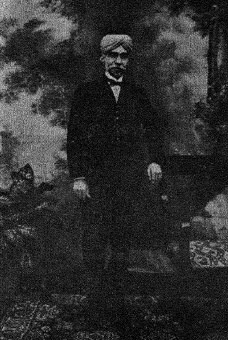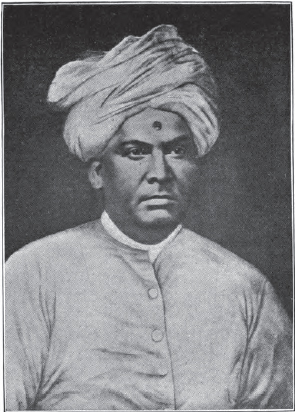The Justice Party, officially the South Indian Liberal Federation, was a political party in the Madras Presidency of British India. It was established on 20 November 1916 in Victoria Public Hall in Madras by Dr C. Natesa Mudaliar and co-founded by T. M. Nair, P. Theagaraya Chetty and Alamelu Mangai Thayarammal as a result of a series of non-Brahmin conferences and meetings in the presidency. Communal division between Brahmins and non-Brahmins began in the presidency during the late-19th and early-20th century, mainly due to caste prejudices and disproportionate Brahminical representation in government jobs. The Justice Party's foundation marked the culmination of several efforts to establish an organisation to represent the non-Brahmins in Madras and is seen as the start of the Dravidian Movement.

Rao Bahadur Sir Vangal Thiruvenkatachari KrishnamachariKCSI, KCIE was an Indian civil servant and administrator. He served as the Diwan of Baroda from 1927 to 1944, Prime Minister of Jaipur State from 1946 to 1949 and as a member of the Rajya Sabha from 1961 to 1964.

Diwan Bahadur Sir Perungavur Rajagopalachari, KCSI, CIE, also spelt in contemporary records as Sir P. Rajagopala Achariyar, was an Indian administrator. He was the Diwan of Cochin State from December 1896 to August 1901 and of Travancore from 1906 to 1914.

Pudukkottai was a kingdom and later a princely state in British India, which existed from 1680 until 1948.
Mylai Chinna Thambi Pillai Rajah was an Indian politician, educationist, social and political activist from the Indian state of Tamil Nadu.

Tiruppur Subrahmanya Avinashilingam Chettiar was an Indian lawyer, politician, freedom fighter and Gandhian. He served as the Education Minister of Madras Presidency from 1946 to 1949 and was responsible for introducing Tamil as the medium of instruction. He is also credited with having commissioned the creation of the first Tamil encyclopedia.

Khan Bahadur Sir Muhammad Habibullah KCSI KCIE was an Indian politician and administrator who served as the Diwan of Travancore from 1934 to 1936.

The second legislative council election to Madras Presidency after the establishment of diarchical system of government by the Government of India Act, 1919 was held in 1923. Voter turnout was higher than the previous election. Swarajists, a breakaway group from Indian National Congress participated in the election. The ruling Justice Party had suffered a split, when a splinter group calling themselves anti-Ministerialists left the party. It won the highest number of seats but fell short of a majority. Nevertheless, Madras Governor Willington invited it to form the government. Incumbent Justice First Minister Panagal Raja was nominated by Party leader Theagaraya Chetty to continue as First Minister for a second term. The government survived a no-confidence motion, brought against it on the first day of its tenure by the opposition headed by C. R. Reddy.
Diwan Bahadur Royapuram Nallaveeran Arogyaswamy Mudaliar was an Indian politician and civil engineer who served as the Minister of Excise, Medical Administration and six other departments in the Madras Presidency from 1926 to 1928.
Diwan Bahadur Lalpet Arunachala Govindaraghava Aiyar (1867-1935) was an Indian lawyer, theosophist, Indian independence activist and politician.

Diwan Bahadur Pattu Kesava Pillai was an Indian journalist, politician and activist of the Indian Independence movement.
Diwan BahadurT. RangachariCIE (1865–1945) was an Indian lawyer, politician, journalist, legislator, and active in the Egmore clique.

The Right Hon.Calamur ViravalliRunganada Sastri was an Indian interpreter, jurist, civil servant, polyglot, and social reformer, who was known for his mastery over Indian and foreign languages alike in both classical and vernacular forms, as well as his general erudition and command of jurisprudence. At his death, he is known to have mastered fourteen languages, and had a conversational command of at least two to four more.
General elections were held in British India in November 1923 for both the Central Legislative Assembly and Provincial Assemblies. The Central Legislative Assembly had 145 seats, of which 105 were elected by the public.
Diwan Bahadur Jannyavula Venkatanarayana Rao NaiduCIE (1870–1955) was an Indian civil servant, writer and politician who served as Commissioner of Madras city from 1925 to 1928.
Mariadas Ruthnaswamy CIE, KCSG (1885–1977) was a leading educationalist, statesman and a writer in Madras, India.

Dewan Bahadur or Diwan Bahadur was a title of honour awarded during British rule in India. It was awarded to individuals who had performed faithful service or acts of public welfare to the nation. From 1911 the title was accompanied by a special Title Badge. Dewan literally means Prime Minister in Indian context and Bahadur means brave.
Diwan Chaman Lall was an Indian politician and diplomat who served as a Member of the Rajya Sabha.
The Sheriff of Madras was an apolitical titular position of authority bestowed for one year on a prominent citizen of Madras. The post was abolished in 1998.

Dewan Bahadur Chevalier Ignatius Xavier Pereira was a colonial-era Ceylonese businessman and politician.










